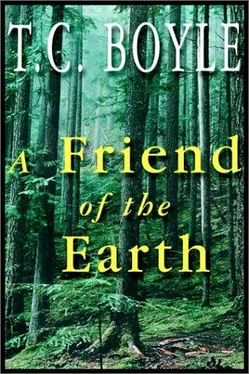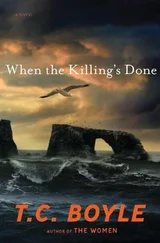"Los edificios, they, they-"
"What edificios?" I'm up now, pulling on my jeans, the anxious faces of Andrea and April Wind hanging on cords in the distance.
"Los, los condos, and Rancho Seco- them too — they are what I think is falling down, I mean like in the corriente, you know, like boom, boom, boom-"
When Frank Buck wanted elephants-that is, when some zoo or circus placed an order-he would cruise over to Ceylon, hire a couple hundred natives and cut down a whole forest's worth of tropical hardwoods to build a pen with a fourhundred-foot chute in front of it. Fifteen-foot-tall logs were set in the ground eighteen inches apart throughout the pen — or kraal, as it was calledand then, using tame elephants to lure the wild ones in close, Buck and his men would stampede the whole lot of them down the chute and into the enclosure as if they were sheep. Uncle Sol, who was there, informed me about this and other peculiarities of the animal trade when I was fifteen, a skinny kid with a mop and shovel, overwhelmed by the sheer amount of ordure-shit, that is-his eight Indian elephants produced daily. There was the dust, he said, that was the first thing you noticed, a roiling river of dust fifty feet high, and then you felt the concussion through the soles of your shoes-fifty or sixty panicked animals weighing up to five tons apiece punishing the ground. But it was the screaming he remembered most, like a brass band hitting nothing but high notes, right off the scale, a noise that shivered and humbled you till the big gate dropped and all that ocean of flesh was just one more commodity for sale and export. The elephants went to Cincinnati, Cleveland, Chicago, Central Park, the big timbers of the kraal rotted and tumbled over and the jungle sprang back up to conceal the next generation of pachyderms.
That was ninety years ago. Now the elephants are gone, and the forest too-Ceylon, last I heard, was 100 percent deforested, a desert of unemployable mahouts and third-generation twig-gatherers. Uncle Sol had it easy-all he had to do was go out into the wilderness and catch things, and it was a deep wilderness, a jungle full of sights unseen and sounds unheard, raffalii and dorango in the trees, chevrotains, tapirs and yes, pangolins poking through the leaves. It's a little different for me and Chuy. There is no wilderness, and there's nothing left to catch, except maybe rats. Our job, as it turns out on this very wet sixth-consecutive day of rain, is to subdue a menagerie of disgruntled, penned-up and reeking animals named after flowers and escort them to higher ground.
Andrea's going to help. So are April Wind and Mac's two bodyguards. We need all the help we can get, because chaos has been unleashed here, two whole sections of the Lupine Hill condos collapsed like wet cardboard (and where are Delbert Sakapathian and his thousand — dollar check now, I wonder), Rancho Seco gone wet suddenly and looking less like a gated community and more like a riverbed every minute, and my own humble abode flooded right up to the high-water mark on my gum boots. At some point, not long after Chuy's revelation in my darkened bedroom, Mac himself appeared at the front door, wrapped up and hooded in a black slicker that might have been a body bag in another incarnation, his eel whips hanging limp, shades misted over. The bodyguards bookended him. The sky was close. My carpets were fishbait and the Titanic was going down fast, "Everybody," he shouted, and even in his extremity his voice was as breathy and sweet as a kindergarten teacher's, "everybody up the hill to my house!"
We're coming, I want to tell him, Andrea scooping up floating paperbacks and doing triage on the kitchen appliances, and you don't have to ask twice — but, first, the animals. Out there in the thick of it, Chuy and I discover that one of the giant anteaters has drowned. I don't know if you can picture a giant anteater offhand — this is the kind of creature that never looked quite real anyway, what with the Mohawk haircut, the underslung bear's feet and the three lengths of hose stuffed into its snout — but it looks even less convincing now, Just dead. Dead and gone. And probably no more than thirty or forty of them left on earth. Even with the rain, even with Andrea and my knee and Mac and the threat of the mucosa. I want to sit down and cry.
Lily, fortunately, is all right-she's dug herself a mound big as a tumulus, and there she is, curled up on top of it like a wet rug. The lions we find stacked up on the roof of the concrete-block structure at the back of their cage, roaring their guts out. Dandelion, the male, looks as if he's been drowned twice and twice resuscitated, the mane drooping round his jowls like some half-finished macrame project. Amaryllis and Buttercup, the lionesses Mac ordered through a breeding-facility catalogue from some place in Ohio, don't look much better. Their eyes tell me they want to be pacing neurotically up and down the length of the chain-link fence that encloses their half-acre savanna, but the whole thing is a three-foot-deep stew of phlegm-colored water and Siamese walking catfish (have I mentioned that some environmental anarchist let half a dozen of them go in Carpinteria twenty years back, just as the weather started to turn?).
"Chuy," I announce, swinging round on him and the two hopeless-looking bodyguards, "the lions are going to be a problem. If we dart them, they're liable to fall into the slop and drown, and if we just wade in there with the wire net, they'll just as likely chew our heads off."
The bodyguards-both of them are named Al, I think-don't look as if they like the sound of this. They're the ones who are going to have to drag a four-hundred-pound cat bristling with claws and teeth through three feet of water and sling it in the back of the Olfputt, and that's no mean feat, whether it's unconscious or not. And then-stirring news — they'll have to go back for the lionesses.
Chuy, meanwhile, is blinking back the rain, hunched and stringy, considering the problem. His slicker, which is at least three sizes too long for him in the arms, is a pale, faded orange in color, liberally stained with Rorschach blots of oil, mold and animal blood. "They can swim, Mr. Ty, nadan estos gatos, and maybe I think we can tie them like caballos, you know, around the neck, and maybe we hook the rope up to the back of the truck, and, you know-"
I'm dazed. Old and dazed. The rain is like a trillion hammers, blow after blow, staggering me. "You mean, we drag them?"
"Sure. And when they see la puerta open wide to that dry warm basement at Mr. Mac's, then maybe yo pienso que where they want to go, verdad?"
Or we could just leave them. The water's probably not going to get up that high, I tell myself, but even so it can't be good for them to be soaked through for days on end — they'll catch cold, won't they? What about in Africa, though — or Africa as it once was? They didn't have lion pens to snuggle in — or multimillionaire pop stars' carpeted, paneled and Ping-Pong-tabled basements either. Yes. Sure. And they died, every last one of them, flagged, skinned and eaten right down to the bone by the pullulating masses of our own degraded species. Africa doesn't matter anymore. Nature doesn't matter anymore-it's not even nature, just something we created out of a witches' brew of fossil-fuel emissions and deforestation. These lions live here, in the Santa Ynez Valley-this is their natural habitat now. And if the valley floods, then we'll move them to higher ground, a new habitat for the infinitely adaptable New Age lion: Maclovio Pulchris' twelve-thousand — square-foot basement.
And you know what I say? Hallelujah and praise the Lord.
Los Angeles/Titusville, July 1989
Читать дальше












